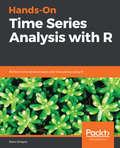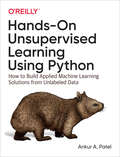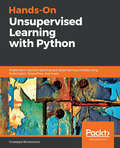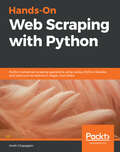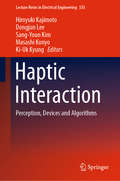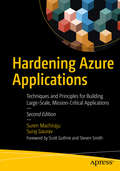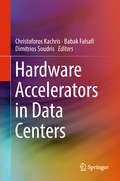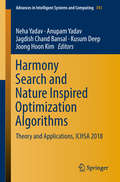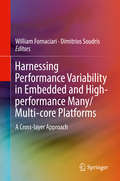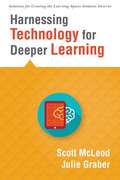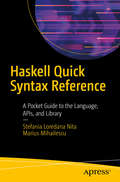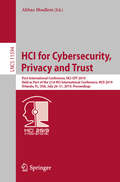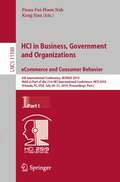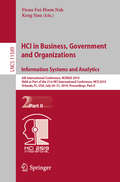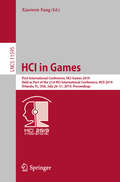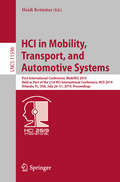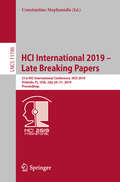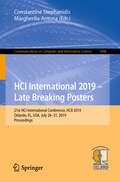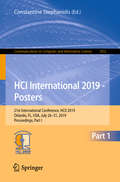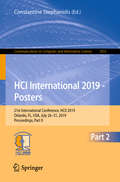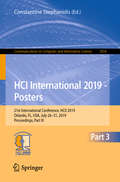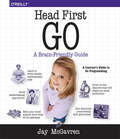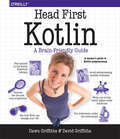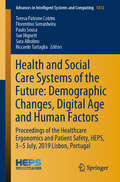- Table View
- List View
Hands-On Time Series Analysis with R: Perform time series analysis and forecasting using R
by Rami KrispinBuild efficient forecasting models using traditional time series models and machine learning algorithms.Key FeaturesPerform time series analysis and forecasting using R packages such as Forecast and h2oDevelop models and find patterns to create visualizations using the TSstudio and plotly packagesMaster statistics and implement time-series methods using examples mentionedBook DescriptionTime series analysis is the art of extracting meaningful insights from, and revealing patterns in, time series data using statistical and data visualization approaches. These insights and patterns can then be utilized to explore past events and forecast future values in the series.This book explores the basics of time series analysis with R and lays the foundations you need to build forecasting models. You will learn how to preprocess raw time series data and clean and manipulate data with packages such as stats, lubridate, xts, and zoo. You will analyze data and extract meaningful information from it using both descriptive statistics and rich data visualization tools in R such as the TSstudio, plotly, and ggplot2 packages. The later section of the book delves into traditional forecasting models such as time series linear regression, exponential smoothing (Holt, Holt-Winter, and more) and Auto-Regressive Integrated Moving Average (ARIMA) models with the stats and forecast packages. You'll also cover advanced time series regression models with machine learning algorithms such as Random Forest and Gradient Boosting Machine using the h2o package.By the end of this book, you will have the skills needed to explore your data, identify patterns, and build a forecasting model using various traditional and machine learning methods.What you will learnVisualize time series data and derive better insightsExplore auto-correlation and master statistical techniquesUse time series analysis tools from the stats, TSstudio, and forecast packagesExplore and identify seasonal and correlation patternsWork with different time series formats in RExplore time series models such as ARIMA, Holt-Winters, and moreEvaluate high-performance forecasting solutionsWho this book is forHands-On Time Series Analysis with R is ideal for data analysts, data scientists, and all R developers who are looking to perform time series analysis to predict outcomes effectively. A basic knowledge of statistics is required; some knowledge in R is expected, but not mandatory.
Hands-On Unsupervised Learning Using Python: How to Build Applied Machine Learning Solutions from Unlabeled Data
by Ankur A. PatelMany industry experts consider unsupervised learning the next frontier in artificial intelligence, one that may hold the key to general artificial intelligence. Since the majority of the world's data is unlabeled, conventional supervised learning cannot be applied. Unsupervised learning, on the other hand, can be applied to unlabeled datasets to discover meaningful patterns buried deep in the data, patterns that may be near impossible for humans to uncover.Author Ankur Patel shows you how to apply unsupervised learning using two simple production-ready Python frameworks: scikit-learn and TensorFlow using Keras. With code and hands-on examples, data scientists will identify difficult-to-find patterns in data and gain deeper business insight, detect anomalies, perform automatic feature engineering and selection, and generate synthetic datasets. All you need is programming and some machine learning experience to get started.Compare the strengths and weaknesses of the different machine learning approaches: supervised, unsupervised, and reinforcement learningSet up and manage machine learning projects end-to-endBuild an anomaly detection system to catch credit card fraudClusters users into distinct and homogeneous groupsPerform semisupervised learningDevelop movie recommender systems using restricted Boltzmann machinesGenerate synthetic images using generative adversarial networks
Hands-On Unsupervised Learning with Python: Implement Machine Learning And Deep Learning Models Using Scikit-learn, Tensorflow, And More
by Giuseppe BonaccorsoThis book is intended for statisticians, data scientists, machine learning developers, and deep learning practitioners who want to build smart applications by implementing key building block - unsupervised learning. Get well versed with all the new techniques and algorithms offered in machine learning and deep learning using real-world examples. Having some knowledge of machine learning concepts, and statistics will definitely help.
Hands-On Web Scraping with Python: Perform advanced scraping operations using various Python libraries and tools such as Selenium, Regex, and others
by Anish ChapagainCollect and scrape different complexities of data from the modern Web using the latest tools, best practices, and techniques Key Features Learn various scraping techniques using a range of Python libraries such as Scrapy and Beautiful Soup Build scrapers and crawlers to extract relevant information from the web Automate web scraping operations to bridge the accuracy gap and ease complex business needs Book Description Web scraping is an essential technique used in many organizations to scrape valuable data from web pages. This book will enable you to delve deeply into web scraping techniques and methodologies. This book will introduce you to the fundamental concepts of web scraping techniques and how they can be applied to multiple sets of web pages. We'll use powerful libraries from the Python ecosystem—such as Scrapy, lxml, pyquery, bs4, and others—to carry out web scraping operations. We will take an in-depth look at essential tasks to carry out simple to intermediate scraping operations such as identifying information from web pages, using patterns or attributes to retrieve information, and others. This book adopts a practical approach to web scraping concepts and tools, guiding you through a series of use cases and showing you how to use the best tools and techniques to efficiently scrape web pages. This book also covers the use of other popular web scraping tools, such as Selenium, Regex, and web-based APIs. By the end of this book, you will have learned how to efficiently scrape the web using different techniques with Python and other popular tools. What you will learn Analyze data and Information from web pages Learn how to use browser-based developer tools from the scraping perspective Use XPath and CSS selectors to identify and explore markup elements Learn to handle and manage cookies Explore advanced concepts in handling HTML forms and processing logins Optimize web securities, data storage, and API use to scrape data Use Regex with Python to extract data Deal with complex web entities by using Selenium to find and extract data Who this book is for This book is for Python programmers, data analysts, web scraping newbies, and anyone who wants to learn how to perform web scraping from scratch. If you want to begin your journey in applying web scraping techniques to a range of web pages, then this book is what you need! A working knowledge of the Python programming language is expected.
Haptic Interaction: Perception, Devices and Algorithms (Lecture Notes in Electrical Engineering #535)
by Hiroyuki Kajimoto Ki-Uk Kyung Masashi Konyo Dongjun Lee Sang-Youn KimThis book constitutes the proceedings of the third international conference AsiaHaptics 2018, held in Songdo, Korea. It presents the state-of-the-art of the diverse haptics (touch)-related research, including perception and illusion, development of haptics devices, and applications to a wide variety of fields such as education, medicine, telecommunication, navigation and entertainment. This book is a valuable resource not only for active haptics researchers, but also for general readers wishing to understand the status quo in this interdisciplinary area of science and technology.
Hardening Azure Applications: Techniques and Principles for Building Large-Scale, Mission-Critical Applications
by Suren Machiraju Suraj GauravBuild large-scale, mission-critical hardened applications on the Azure cloud platform. This 2nd edition provides information on the newer features in Azure, such as Linux extensions and supporting Azure Services such as HDInsight and SQL Server on Linux. Updated with new applications Hardening Azure Applications also discusses Scale Sets (VMSS), a major upgrade that enables autoscaling and seamlessly makes machines ready for high availability. The authors take you step by step through the process of evaluating and building applications with the appropriate hardness attributes. After a small introduction to cloud computing, you will learn about various cloud and hardened cloud applications in detail. Next, you will discover service fundamentals such as instrumentation, telemetry, and monitoring followed by key application experiences. Further, you will cover availability and the economics of 9s. Towards the end, you will see how to secure your application and learn about the modernization of software organisations, a new topic in this edition.After reading this book, you will master the techniques and engineering principles that every architect and developer needs to know to harden their Azure/.NET applications to ensure maximum reliability and high availability when deployed at scale.What You Will LearnUse techniques and principles to harden Azure/.NET applicationsSecure your applications on AzureCreate a scale set on Azure Work with service fundamentals such as instrumentation, telemetry, and monitoringWho This Book Is ForDevelopers and IT professionals who are working on Azure applications.
Hardware Accelerators in Data Centers
by Christoforos Kachris Babak Falsafi Dimitrios SoudrisThis book provides readers with an overview of the architectures, programming frameworks, and hardware accelerators for typical cloud computing applications in data centers. The authors present the most recent and promising solutions, using hardware accelerators to provide high throughput, reduced latency and higher energy efficiency compared to current servers based on commodity processors. Readers will benefit from state-of-the-art information regarding application requirements in contemporary data centers, computational complexity of typical tasks in cloud computing, and a programming framework for the efficient utilization of the hardware accelerators.
Harmony Search and Nature Inspired Optimization Algorithms: Theory and Applications, ICHSA 2018 (Advances in Intelligent Systems and Computing #741)
by Neha Yadav Anupam Yadav Jagdish Chand Bansal Kusum Deep Joong Hoon KimThe book covers different aspects of real-world applications of optimization algorithms. It provides insights from the Fourth International Conference on Harmony Search, Soft Computing and Applications held at BML Munjal University, Gurgaon, India on February 7–9, 2018. It consists of research articles on novel and newly proposed optimization algorithms; the theoretical study of nature-inspired optimization algorithms; numerically established results of nature-inspired optimization algorithms; and real-world applications of optimization algorithms and synthetic benchmarking of optimization algorithms.
Harnessing Performance Variability in Embedded and High-performance Many/Multi-core Platforms: A Cross-layer Approach
by William Fornaciari Dimitrios SoudrisThis book describes the state-of-the art of industrial and academic research in the architectural design of heterogeneous, multi/many-core processors. The authors describe methods and tools to enable next-generation embedded and high-performance heterogeneous processors to confront cost-effectively the inevitable variations by providing Dependable-Performance: correct functionality and timing guarantees throughout the expected lifetime of a platform under thermal, power, and energy constraints. Various aspects of the reliability problem are discussed, at both the circuit and architecture level, the intelligent selection of knobs and monitors in multicore platforms, and systematic design methodologies. The authors demonstrate how new techniques have been applied in real case studies from different applications domain and report on results and conclusions of those experiments. Enables readers to develop performance-dependable heterogeneous multi/many-core architectures Describes system software designs that support high performance dependability requirements Discusses and analyzes low level methodologies to tradeoff conflicting metrics, i.e. power, performance, reliability and thermal management Includes new application design guidelines to improve performance dependability
Harnessing Technology for Deeper Learning
by Scott McLeod; Julie GraberSeeking a New Approach; Introducing the 4 Shifts Protocol; Redesigning Elementary School Lessons and Units; Redesigning Secondary Lessons and Units; Designing From Standards; Implementing the Protocol Tips, Strategies, and Other Suggestions.
Hash Crack: Password Cracking Manual (V3 Series)
by Joshua PicoletThe Hash Crack: Password Cracking Manual v3 is an expanded reference guide for password recovery (cracking) methods, tools, and analysis techniques. A compilation of basic and advanced techniques to assist penetration testers and network security professionals evaluate their organization's posture. The Hash Crack manual contains syntax and examples for the most popular cracking and analysis tools and will save you hours of research looking up tool usage. It also includes basic cracking knowledge and methodologies every security professional should know when dealing with password attack capabilities. Hash Crack contains all the tables, commands, online resources, and more to complete your cracking security kit. This version expands on techniques to extract hashes from a myriad of operating systems, devices, data, files, and images. Lastly, it contains updated tool usage and syntax for the most popular cracking tools.
Haskell Quick Syntax Reference: A Pocket Guide to the Language, APIs, and Library
by Stefania Loredana Nita Marius MihailescuThis condensed code and syntax reference presents the essential Haskell syntax in a well-organized format that can be used as a quick and handy reference, including applications to cloud computing and data analysis. This book covers the functional programming features of Haskell as well as strong static typing, lazy evaluation, extensive parallelism, and concurrency You won’t find any technical jargon, bloated samples, drawn out history lessons, or witty stories in this book. What you will find is a language reference that is concise, to the point and highly accessible. The Haskell Quick Syntax Reference is packed with useful information and is a must-have for any Haskell programmer working in big data, data science, and cloud computing.What You Will LearnQuickly and effectively use the Haskell programming languageTake advantage of strong static typingWork with lazy evaluations Harness concurrency and extensive parallelism using HaskellWho This Book Is ForExperienced programmers who may be new to Haskell or have experience with Haskell and who just want a quick reference guide on it.
HCI for Cybersecurity, Privacy and Trust: First International Conference, HCI-CPT 2019, Held as Part of the 21st HCI International Conference, HCII 2019, Orlando, FL, USA, July 26–31, 2019, Proceedings (Lecture Notes in Computer Science #11594)
by Abbas MoallemThis book constitutes the thoroughly refereed proceedings of the First International Conference on HCI for Cybersecurity, Privacy and Trust, HCI-CPT 2019, which was held as part of the 21st HCI International Conference, HCII 2019, in Orlando, FL, USA, in July 2019.The total of 1275 papers and 209 posters included in the 35 HCII 2019 proceedings volumes were carefully reviewed and selected from 5029 submissions. HCI-CPT 2019 includes a total of 32 papers; they were organized in topical sections named: Authentication; cybersecurity awareness and behavior; security and usability; and privacy and trust.
HCI in Business, Government and Organizations. eCommerce and Consumer Behavior: 6th International Conference, HCIBGO 2019, Held as Part of the 21st HCI International Conference, HCII 2019, Orlando, FL, USA, July 26-31, 2019, Proceedings, Part I (Lecture Notes in Computer Science #11588)
by Fiona Fui-Hoon Nah Keng SiauThis two-volume set LNCS 11588 and 11589 constitutes the refereed proceedings of the 6th International Conference on Business, Government, and Organizations, HCIBGO 2019, held in July 2019 as part of HCI International 2019 in Orlando, FL, USA. HCII 2019 received a total of 5029 submissions, of which 1275 papers and 209 posters were accepted for publication after a careful reviewing process. The 63 papers presented in these two volumes are organized in topical sections named: Electronic, Mobile and Ubiquitous Commerce, eBanking and Digital Money, Consumer Behaviour, Business Information Systems, Dashboards and Visualization, Social Media and Big Data Analytics in B
HCI in Business, Government and Organizations. Information Systems and Analytics: 6th International Conference, HCIBGO 2019, Held as Part of the 21st HCI International Conference, HCII 2019, Orlando, FL, USA, July 26-31, 2019, Proceedings, Part II (Lecture Notes in Computer Science #11589)
by Fiona Fui-Hoon Nah Keng SiauThis two-volume set LNCS 11588 and 11589 constitutes the refereed proceedings of the 6th International Conference on Business, Government, and Organizations, HCIBGO 2019, held in July 2019 as part of HCI International 2019 in Orlando, FL, USA. HCII 2019 received a total of 5029 submissions, of which 1275 papers and 209 posters were accepted for publication after a careful reviewing process. The 63 papers presented in these two volumes are organized in topical sections named: Electronic, Mobile and Ubiquitous Commerce, eBanking and Digital Money, Consumer Behaviour, Business Information Systems, Dashboards and Visualization, Social Media and Big Data Analytics in B
HCI in Games: First International Conference, HCI-Games 2019, Held as Part of the 21st HCI International Conference, HCII 2019, Orlando, FL, USA, July 26–31, 2019, Proceedings (Lecture Notes in Computer Science #11595)
by Xiaowen FangThis book constitutes the refereed proceedings of the First International Conference on HCI in Games, HCI-Games 2019, held in July 2019 as part of HCI International 2019 in Orlando, FL, USA. HCII 2019 received a total of 5029 submissions, of which 1275 papers and 209 posters were accepted for publication after a careful reviewing process. The 34 papers presented in this volume are organized in topical sections named: Game Design; Gaming Experience; Serious Games; and Gamification.
HCI in Mobility, Transport, and Automotive Systems: First International Conference, MobiTAS 2019, Held as Part of the 21st HCI International Conference, HCII 2019, Orlando, FL, USA, July 26-31, 2019, Proceedings (Lecture Notes in Computer Science #11596)
by Heidi KrömkerThis book constitutes the refereed proceedings of the First International Conference on HCI in Mobility, Transport, and Automotive Systems, MobiTAS 2019, held as part of the 21st International Conference on Human-Computer Interaction, HCII 2019, in Orlando, FL, USA in July, 2019. The 1274 full papers and 209 posters presented at the HCII 2019 conferences were carefully reviewed and selected from 5029 submissions. The papers cover the entire field of human-computer interaction, addressing major advances in knowledge and effective use of computers in a variety of application areas. The papers in this volume are organized in the following topical sections: interaction in autonomous and semiautonomous vehicles; driving experience; and mobility and transport.
HCI International 2019 – Late Breaking Papers: 21st HCI International Conference, HCII 2019, Orlando, FL, USA, July 26–31, 2019, Proceedings (Lecture Notes in Computer Science #11786)
by Constantine StephanidisThis year the 21st International Conference on Human-Computer Interaction, HCII 2019, which was held in Orlando, Florida, USA, in July 2019, introduced the additional option of "late-breaking work", which applied both for papers and posters with the corresponding volumes of the proceedings. The 47 late-breaking papers included in this volume were published after the conference has taken place. They were organized in the following topical sections: user experience design and evaluation; information, visualization, and decision making; virtual and augmented reality; learning and games; human and task models in HCI; and design and user experience case studies.
HCI International 2019 – Late Breaking Posters: 21st HCI International Conference, HCII 2019, Orlando, FL, USA, July 26–31, 2019, Proceedings (Communications in Computer and Information Science #1088)
by Constantine Stephanidis Margherita AntonaThis book constitutes the extended abstracts of the posters presented during the 21st International Conference on Human-Computer Interaction, HCII 2019, which took place in Orlando, Florida, in July 2019. The total of 1274 papers and 209 posters included in the 35 HCII 2019 proceedings volumes was carefully reviewed and selected from 5029 submissions. The 55 papers presented in this volume are organized in topical sections as follows: interaction design; cognitive issues in HCI; accessibility and universal access; learning and games; HCI in health and rehabilitation; HCI in business and society; big data, machine learning and visual analytics; and user studies.
HCI International 2019 - Posters: 21st International Conference, HCII 2019, Orlando, FL, USA, July 26–31, 2019, Proceedings, Part I (Communications in Computer and Information Science #1032)
by Constantine StephanidisThe three-volume set CCIS 1032, CCIS 1033, and CCIS 1034 contains the extended abstracts of the posters presented during the 21st International Conference on Human-Computer Interaction, HCII 2019, which took place in Orlando, Florida, in July 2019.The total of 1274 papers and 209 posters included in the 35 HCII 2019 proceedings volumes was carefully reviewed and selected from 5029 submissions.The 208 papers presented in these three volumes are organized in topical sections as follows: Part I: design, development and evaluation methods and technique; multimodal Interaction; security and trust; accessibility and universal access; design and user experience case studies. Part II:interacting with games; human robot interaction; AI and machine learning in HCI; physiological measuring; object, motion and activity recognition; virtual and augmented reality; intelligent interactive environments. Part III: new trends in social media; HCI in business; learning technologies; HCI in transport and autonomous driving; HCI for health and well-being.
HCI International 2019 - Posters: 21st International Conference, HCII 2019, Orlando, FL, USA, July 26–31, 2019, Proceedings, Part II (Communications in Computer and Information Science #1033)
by Constantine StephanidisThe three-volume set CCIS 1032, CCIS 1033, and CCIS 1034 contains the extended abstracts of the posters presented during the 21st International Conference on Human-Computer Interaction, HCII 2019, which took place in Orlando, Florida, in July 2019.The total of 1274 papers and 209 posters included in the 35 HCII 2019 proceedings volumes was carefully reviewed and selected from 5029 submissions.The 208 papers presented in these three volumes are organized in topical sections as follows: Part I: design, development and evaluation methods and technique; multimodal Interaction; security and trust; accessibility and universal access; design and user experience case studies. Part II:interacting with games; human robot interaction; AI and machine learning in HCI; physiological measuring; object, motion and activity recognition; virtual and augmented reality; intelligent interactive environments. Part III: new trends in social media; HCI in business; learning technologies; HCI in transport and autonomous driving; HCI for health and well-being.
HCI International 2019 - Posters: 21st International Conference, HCII 2019, Orlando, FL, USA, July 26–31, 2019, Proceedings, Part III (Communications in Computer and Information Science #1034)
by Constantine StephanidisThe three-volume set CCIS 1032, CCIS 1033, and CCIS 1034 contains the extended abstracts of the posters presented during the 21st International Conference on Human-Computer Interaction, HCII 2019, which took place in Orlando, Florida, in July 2019.The total of 1274 papers and 209 posters included in the 35 HCII 2019 proceedings volumes was carefully reviewed and selected from 5029 submissions.The 208 papers presented in these three volumes are organized in topical sections as follows: Part I: design, development and evaluation methods and technique; multimodal Interaction; security and trust; accessibility and universal access; design and user experience case studies. Part II:interacting with games; human robot interaction; AI and machine learning in HCI; physiological measuring; object, motion and activity recognition; virtual and augmented reality; intelligent interactive environments. Part III: new trends in social media; HCI in business; learning technologies; HCI in transport and autonomous driving; HCI for health and well-being.
Head First Go
by Jay McGavrenGo represents an attempt to improve on some weaknesses of traditional compiled programming languages. It de-emphasizes or removes error-prone language structures like class inheritance and exception handling. It features great concurrency support and automatic memory management (garbage collection).Existing Go books tend to be highly technical in nature, teaching all aspects of the language regardless of their relevance to beginners. This book, rather than talking about the features of Go in abstract terms, features simple, clear examples that demonstrate Go in action, and diagrams to explain difficult concepts.This book will not only teach developers basic language features, it will get them comfortable consulting error output, documentation, and search engines to find solutions to problems. It will teach all the conventions and techniques that employers expect an entry-level Go developer to know.
Head First Kotlin: A Brain-Friendly Guide
by Dawn Griffiths David GriffithsWhat will you learn from this book?Head First Kotlin is a complete introduction to coding in Kotlin. This hands-on book helps you learn the Kotlin language with a unique method that goes beyond syntax and how-to manuals and teaches you how to think like a great Kotlin developer. You’ll learn everything from language fundamentals to collections, generics, lambdas, and higher-order functions. Along the way, you’ll get to play with both object-oriented and functional programming. If you want to really understand Kotlin, this is the book for you.Why does this book look so different?Based on the latest research in cognitive science and learning theory, Head First Kotlin uses a visually rich format to engage your mind rather than a text-heavy approach that puts you to sleep. Why waste your time struggling with new concepts? This multisensory learning experience is designed for the way your brain really works.
Health and Social Care Systems of the Future: Proceedings of the Healthcare Ergonomics and Patient Safety, HEPS, 3-5 July, 2019 Lisbon, Portugal (Advances in Intelligent Systems and Computing #1012)
by Teresa Patrone Cotrim Florentino Serranheira Paulo Sousa Sue Hignett Sara Albolino Riccardo TartagliaThis book discusses how digital technology and demographic changes are transforming the patient experience, services, provision, and planning of health and social care. It presents innovative ergonomics research and human factors approaches to improving safety, working conditions and quality of life for both patients and healthcare workers. Personalized medicine, mobile and wearable technologies, and the greater availability of health data are discussed, together with challenges and evidence-based practice. Based on the Healthcare Ergonomics and Patient Safety conference, HEPS2019, held on July 3-5, 2019, in Lisbon, Portugal, this book offers a timely resource for graduate students and researchers, as well as for healthcare professionals managing service provision, planners and designers for healthcare buildings and environments, and international healthcare organizations.
